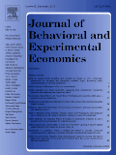
Journal of Behavioral and Experimental Economics
Scope & Guideline
Pioneering Studies in Behavioral Dynamics
Introduction
Aims and Scopes
- Behavioral Economics and Finance:
The journal explores how psychological factors influence economic decisions, such as investment behaviors, risk preferences, and market anomalies. It emphasizes the role of bounded rationality and emotional biases in financial markets. - Public Policy and Social Preferences:
Research in this area investigates the implications of behavioral insights for public policy, including taxation, welfare, and environmental policy. It often examines how social norms and preferences shape public goods provision and collective actions. - Experimental Methodologies:
The journal prioritizes studies employing experimental methods, including laboratory and field experiments, to assess decision-making processes in real-world scenarios. This emphasis on empirical evidence distinguishes its contributions to economic theory. - Consumer Behavior and Marketing:
Papers frequently address consumer decision-making, including the impact of nudges, framing effects, and social influences on purchasing behavior. The journal seeks to bridge the gap between economic theory and practical marketing strategies. - Cultural and Social Influences:
Research often considers how cultural contexts and social structures influence economic behaviors. This includes studies on gender differences, religious influences, and the impact of identity on economic decisions. - Risk and Uncertainty:
The journal investigates how individuals perceive and respond to risk and uncertainty in various contexts, including health, finance, and environmental issues. This includes exploring concepts like loss aversion and ambiguity aversion.
Trending and Emerging
- Digital Behavior and Technology:
There is a growing emphasis on how digital environments and technology influence economic decision-making. Research explores topics such as online consumer behavior, algorithmic trading, and the impact of artificial intelligence on financial markets. - Health Economics and Behavioral Insights:
The COVID-19 pandemic has accelerated interest in health-related economic behaviors. Studies focus on vaccination behaviors, health compliance, and the psychological factors driving health-related decisions. - Sustainability and Environmental Economics:
An increasing number of papers examine consumer behavior related to sustainability, climate change, and environmental policies. This trend reflects a broader societal focus on ecological issues and the behavioral changes necessary to address them. - Social Justice and Inequality:
Emerging themes in social preferences and attitudes towards redistribution highlight a growing interest in economic inequality and its behavioral implications. Research often focuses on how perceptions of fairness influence support for social policies. - Behavioral Interventions and Nudging:
The application of nudging techniques to influence behavior in various domains, including finance, health, and environmental conservation, has gained traction. This reflects a broader interest in practical applications of behavioral economics to drive positive social change. - Cultural Influences on Economic Behavior:
Research increasingly examines how cultural contexts shape economic behaviors, with studies focusing on cross-cultural comparisons and the impact of social identity on decision-making processes.
Declining or Waning
- Traditional Economic Models:
Research relying solely on classical economic models without incorporating behavioral insights has become less frequent. The shift towards a more integrated approach that combines behavioral elements with traditional economic theories is evident. - Purely Theoretical Papers:
There is a noticeable decline in submissions that focus exclusively on theoretical frameworks without empirical validation. The journal's emphasis on experimental evidence has led to a preference for studies that can demonstrate practical applications. - Generalized Risk Aversion Studies:
While risk aversion remains a relevant topic, studies that merely replicate previous findings without introducing new insights or methodologies are being published less frequently. Researchers are encouraged to explore more nuanced aspects of risk behavior. - Overly Simplistic Explanations of Behavior:
Papers that offer simplistic or monolithic explanations for complex behavioral phenomena are waning. The journal increasingly favors multifaceted approaches that consider a variety of influencing factors.
Similar Journals
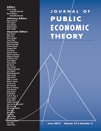
Journal of Public Economic Theory
Pioneering Research in Fiscal and Welfare EconomicsJournal of Public Economic Theory, published by WILEY, is an esteemed journal that focuses on the rigorous analysis and exploration of the theories and applications of public economics. With an ISSN of 1097-3923 and E-ISSN 1467-9779, this journal serves as a pivotal platform for researchers, professionals, and students engaged in economics, finance, sociology, and political science. Ranking in the prestigious Q1 and Q2 quartiles across various categories, including Economics and Econometrics as well as Sociology and Political Science, the journal is recognized for its significant contribution to the field. Its broad scope encompasses critical issues related to public policy, welfare economics, and fiscal policy, catering to an international audience. While the journal is not open access, its articles undergo a stringent peer-review process to ensure high-quality research dissemination. With a commitment to fostering scholarly dialogue and understanding, the Journal of Public Economic Theory remains an essential resource for those seeking to delve into the complexities of public economic issues, with a historical record of publication from 1999 to 2024.

B E Journal of Theoretical Economics
Fostering innovative discussions in theoretical economics.The B E Journal of Theoretical Economics, published by WALTER DE GRUYTER GMBH, is a prominent academic journal based in Germany, dedicated to advancing research in the field of theoretical economics. With an ISSN of 2194-6124 and an E-ISSN of 1935-1704, this journal has been a valuable resource for scholars since its inception. Recognized for its contributions to the economics domain, it holds a Q3 ranking in the Economics, Econometrics and Finance category as of 2023, positioning it among noteworthy publications within the discipline. Although the journal operates under a traditional publishing model rather than open access, it remains committed to disseminating high-quality theoretical research and fostering scholarly discussions that bridge various economic theories and applications. Researchers, professionals, and students looking to deepen their understanding of economic theory will find a wealth of insights and innovative perspectives within the journal's pages, which have been published with a focus on evolving theoretical frameworks from 2001 to 2003 and again since 2007 through 2024.

Behavioral Research in Accounting
Advancing Insights into Decision-Making in Financial ContextsBehavioral Research in Accounting is an esteemed journal published by the American Accounting Association, featuring groundbreaking research at the intersection of accounting practices and human behavior. Focused on illuminating the complexities of decision-making and organizational dynamics within the field of accounting, this journal caters to an audience of researchers, practitioners, and students eager to advance their understanding of behavioral phenomena as they relate to financial management and organizational effectiveness. With a commitment to rigorous peer-reviewed scholarship, it holds a prestigious position as a Q1 journal in Accounting and Q2 in Organizational Behavior and Human Resource Management as of 2023, demonstrating its impact and relevance to the academic community. The journal is indexed in Scopus, ranking 79th in Accounting and 103rd in Organizational Behavior, affirming its vital role in the dissemination of high-quality research. Authors and readers can expect to engage with innovative perspectives and empirical studies that shape the future of accounting practices, underlining the journal's mission to enhance the understanding of human behavior in financial contexts.
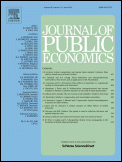
JOURNAL OF PUBLIC ECONOMICS
Fostering knowledge in the realm of public economics.JOURNAL OF PUBLIC ECONOMICS is a leading academic journal published by ELSEVIER SCIENCE SA, dedicated to the field of public economics, which encompasses a broad range of topics including taxation, government expenditure, and the effects of public policies on the economy. With an impressive impact factor reflected by its prestigious Q1 category rankings in both Economics and Finance, this journal is recognized as a vital resource for researchers and practitioners alike. Its robust Scopus rankings place it in the top percentile, with Finance ranked #8 out of 317 and Economics ranked #19 out of 716, demonstrating its influential role in advancing knowledge and fostering discourse within its discipline. Covering the period from 1972 through 2024, the journal publishes original research and insightful reviews that encourage evidence-based policy-making, making it an essential read for those seeking to deepen their understanding of the intersections between economics and public policy. Please note that the journal operates under a subscription model of access, ensuring high-quality content is readily available to its readership.
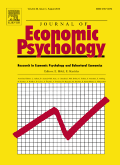
JOURNAL OF ECONOMIC PSYCHOLOGY
Connecting Economic Theory with Psychological PracticeThe Journal of Economic Psychology is a premier academic publication dedicated to advancing the understanding of the interrelations between economic behaviors and psychological processes. Published by Elsevier, this journal has established itself as a critical resource for researchers and practitioners in the fields of *Applied Psychology*, *Economics and Econometrics*, and *Sociology and Political Science*, boasting an impressive *Q1* ranking in each category as of 2023. Since its inception in 1981 and with a commitment extending to 2024, the journal provides a platform for high-quality, peer-reviewed research that influences both theoretical frameworks and practical applications. With a rich interdisciplinary approach, the journal addresses pressing issues at the intersection of economics and psychology, facilitating a deeper understanding of how psychological factors drive economic decisions. Researchers looking to share innovative findings, as well as professionals seeking to implement evidence-based practices, will find the *Journal of Economic Psychology* an invaluable asset in their work. The emphasis on rigorous methodologies and relevant topics makes this journal not just a repository of knowledge, but a beacon for future studies that link economic and psychological insights.
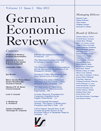
German Economic Review
Illuminating the Landscape of Economics and EconometricsGerman Economic Review is a distinguished academic journal published by WALTER DE GRUYTER GMBH, focusing on diverse aspects of economics and econometrics. With its ISSN 1465-6485 and E-ISSN 1468-0475, the journal serves as a vital platform for disseminating high-quality research from both established scholars and emerging voices in the economic field. Housed in the UK, the journal contributes significantly to the academic community, evidenced by its placement in the Q3 category for Economics and Econometrics in 2023 and its Scopus ranking of #381 out of 716, reflecting its impactful presence in the discipline. German Economic Review does not offer open access options; however, its convergence from 2001 to 2024 indicates a long-standing commitment to advancing economic discourse. This journal is ideal for researchers, professionals, and students eager to engage with contemporary economic theories and applications.
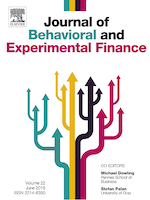
Journal of Behavioral and Experimental Finance
Unlocking Behavioral Insights for Financial InnovationJournal of Behavioral and Experimental Finance, published by Elsevier, stands as a premier outlet for groundbreaking research in the realm of finance, particularly focusing on the psychological and behavioral factors that influence financial decision-making. With an ISSN of 2214-6350 and an E-ISSN of 2214-6369, this journal has established itself within the top tier, achieving a Q1 ranking in Finance for 2023, and is currently positioned 10th out of 317 journals in the Scopus category of Economics, Econometrics and Finance, demonstrating a remarkable 97th percentile ranking. Aiming to bridge theoretical advancements with practical applications, the journal encourages submissions that explore innovative methodologies and empirical studies, offering valuable insights for academics, practitioners, and students alike. As a vital resource for those interested in the confluence of psychology and finance, the Journal of Behavioral and Experimental Finance is pivotal in shaping the future of financial research and practice.
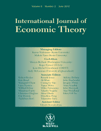
International Journal of Economic Theory
Empowering researchers to shape the future of economics.International Journal of Economic Theory, published by Wiley, serves as a vital platform for scholars and researchers in the fields of economics and econometrics. With its ISSN 1742-7355 and E-ISSN 1742-7363, this journal focuses on advancing theoretical understandings in economics, providing a comprehensive analysis of contemporary economic issues. The journal has been converging knowledge and innovation since its inception in 2009 and continues to sustain a commitment to high-quality research until 2024. As a Q3 journal in the 2023 category rankings, it ranks in the 21st percentile in Scopus for Economics and Econometrics, reflecting its established presence amidst competitive scholarly discourse. Although it is not open access, the journal is widely accessible through institutional subscriptions, facilitating learning and research for professionals, graduate students, and academic leaders. The International Journal of Economic Theory is pivotal for those looking to contribute to economic thought, ensuring that emerging theories find a respected outlet in the global academic landscape.

International Studies of Economics
Exploring the frontiers of economics and finance.International Studies of Economics is an emerging open access journal published by WILEY, dedicated to advancing the field of economics, econometrics, and finance. With its first issue released in 2022, the journal aims to serve as a vital platform for scholars, researchers, and practitioners to share innovative insights and contemporary studies. Operating under an open access model since its inception, International Studies of Economics ensures that research findings are widely disseminated, fostering collaboration and accessibility within the academic community. The journal currently holds a Q3 ranking in the category of Economics, Econometrics, and Finance, highlighting its potential for impactful contributions in the field as it converges its content between 2022 and 2024. By addressing a diverse range of topics and employing rigorous methodologies, this journal seeks to enrich economic discourse and guide evidence-based decision making in both public and private sectors. Joining the discourse in this growing field is essential, and International Studies of Economics welcomes submissions that challenge existing paradigms and contribute to the collective understanding of global economic dynamics.
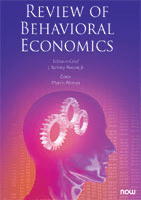
Review of Behavioral Economics
Innovating Understanding in Behavioral EconomicsThe Review of Behavioral Economics, published by NOW PUBLISHERS INC, is a distinguished academic journal that focuses on the intersection of economics and psychology, shedding light on the behavioral dimensions that influence economic decision-making. With an ISSN of 2326-6198 and E-ISSN of 2326-6201, this journal serves a critical role in advancing theoretical and empirical research within its field, noted for its rigorous peer-review process. As recognized by its strong performance metrics, it holds a Q2 ranking in both Economics, Econometrics and Finance and Social Sciences categories, as well as a Q3 ranking in Social Psychology for 2023, underscoring its relevance and impact. Researchers and practitioners can access cutting-edge findings and comprehensive reviews that address contemporary issues in behavioral economics, providing invaluable insights for both academia and applied contexts. With a publication span from 2019 to 2024, the journal is a pivotal resource for those aiming to navigate and innovate within this dynamic field.